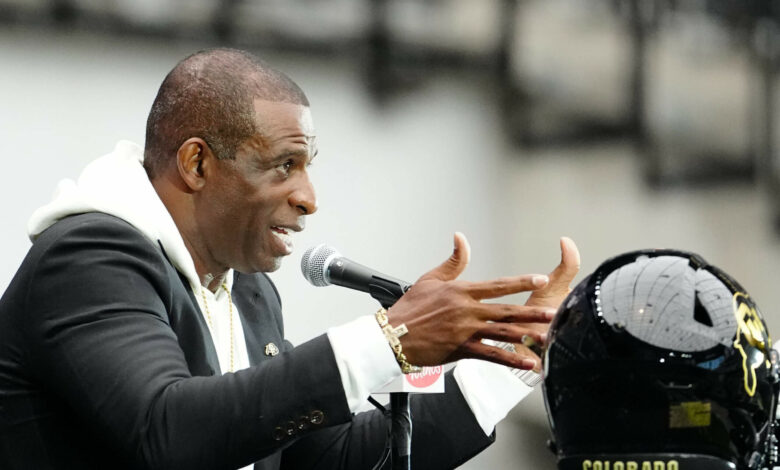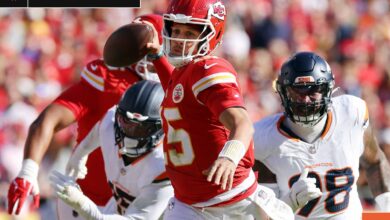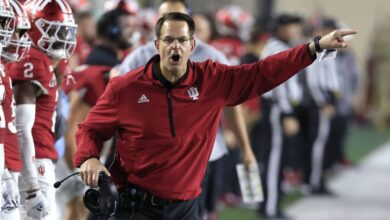Deion Sanders talks a lot about character, but his bullying shows little of it

Deion Sanders’ press conferences often feel like a sermon. When he’s on fire, his words have a rhythm and energy that reminds me of a Sunday morning in a black church. He’ll have you believe his purpose in being at Colorado is bigger than football. Winning may be important, but developing well-rounded people and well-rounded players is imperative. When he talks about the types of recruits he’s looking for, he mentions intelligence, speed and toughness, but there’s extra emphasis when he talks about character and discipline. He stretches those words out and lets them hang in the air.
Today, those words ring hollow. Today, Sanders sounds and looks like a hypocrite. The man who once refused to ignore a mean verbal insult from an opponent because “my mother taught me you’re not going to attack me, and I’m not going to sit back and say nothing,” now refuses to answer questions from a local columnist because he doesn’t like what the person has written about him and the program.
From my perspective, that doesn’t look like character. It looks more like cowardice.

GALLING DEEPER
Sanders and Buffs will no longer answer questions from local columnists
Everyone knows you don’t run from a bully, real or not. You stand up to the person. Would Sanders tell his team to run and hide when they were facing an opponent favored by two or three touchdowns? Of course not. He would tell his players to stand their ground and meet the moment.
But in this case, he requested or allowed the Colorado athletic department to inform The Denver Post that no one from the football program would answer questions from columnist Sean Keeler because of “a series of persistent, personal attacks” in Keeler’s coverage of the program. Asked for specific examples, a sports information staffer cited the use of phrases such as “false prophet,” “Deposition Deion,” “Planet Prime,” “Bruce Lee of BS,” “the Deion Kool-Aid” and “circus,” the Post reported.
I can understand Sanders being bothered by such characterizations, but I also know that an FBS head coach’s skin has to be thicker than a sheet of toilet paper. However, Sanders has never taken criticism well, going back to his days as a professional football and baseball player.

Free daily sports updates straight to your inbox.
Free daily sports updates straight to your inbox.
When he played for the Atlanta Braves and Atlanta Falcons on the same day decades ago, Tim McCarver, a catcher turned broadcaster, criticized him for it. McCarver was a purist and didn’t like what he saw as a circus. Sanders later responded by dumping several buckets of ice-cold water over McCarver’s head in the clubhouse.
A few years ago, while coaching at Jackson State, Sanders refused to answer a reporter’s question when he addressed him as Deion instead of Coach Prime at Southwestern Conference media day.
“If you call Nick (Saban) Nick, you’ll get called names on the spot,” Sanders told the reporter, referring to the former Alabama coach. “So don’t do that to me. Treat me like Nick.”
Two weeks ago, Sanders waved away a CBS reporter after learning of his affiliation.
“I don’t do anything with CBS. Next question,” he said. “It has nothing to do with you. It’s up there. It has nothing to do with you. I love you. I appreciate you. I respect you. It has nothing to do with you. They know what they did.”
In that same press conference, Sanders also refused to answer a question from Keeler. Once is an accident, twice is a coincidence, and three times is a pattern of behavior.
Sanders made amends with CBS reporter Eric Christensen the following week, offering him a one-on-one interview, but the situation with Keeler is unlikely to be resolved as quickly or smoothly. Department officials have not indicated when or if their position will change, but they said they will continue to accredit Keeler and other Post reporters for football games, practices and other events. Keeler will not be accredited for inquiries from the football program, but he can interview administrators, coaches and participants in other sports.
Attempts to control the sports media are not new, especially in college football. In 2012, for example, USC briefly suspended a media employee after he reported a player’s injury. And last season, the Trojans temporarily suspended a reporter for reporting on a conversation two players had with the media.
There are other examples and battles that are fought that the public never hears about, and without a coach who preaches love, peace and empathy, running away from the opportunity to show his players how to handle a difficult situation. But that’s what bullies do, right? When they realize they probably won’t win, they turn around and run. They give ammunition to critics who might claim that their sermons are nothing more than empty words, dressed up in style but devoid of substance.
Required reading
(Photo: Louis Grasse/Getty Images)




